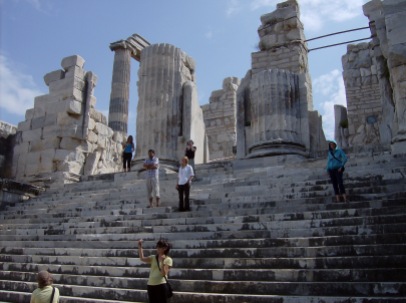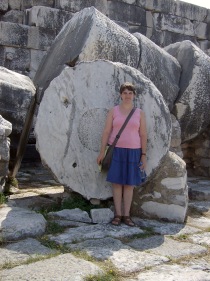
We’re back with a full-length episode! For episode 27, we crack open our shiny new copy of Emily Wilson’s translation of The Odyssey! After a chat about the challenges of accessing myths through translation, we take a look at a small episode that makes up a big part of the Trojan War myth. We hope we do this beautiful translation justice!
We also have listener mail from Andrew, who asks us for some reading recommendations. Check out our recommended reading and listening!
Listen now.
Download this episode (right click and save)
Source Passages
Odyssey 8. 482- 520 (Trans. Wilson).
Translation Sources
Homer. Odyssey. Trans. Richmond Lattimore. 1967.
Homer. Odyssey. Trans. Emily Wilson. 2018.
Recommended Listening
Aven McMaster & Mark Sundaram. The Endless Knot. Episode 50: Translating the Odyssey, with Emily Wilson. Jan. 3, 2018.
Curtis Dozier. Mirror of Antiquity. Episode 1: Translating the Past, with Rachel Kitzinger. Jan. 2, 2018.
Jeff Wright. Trojan War: The Podcast.
Recommended Reading
Bruce Meyer. Heroes: From Heracles to Superman. 2007.
Bruno Snell. The Discovery of the Mind in Greek Philosophy and Literature. 2011.
Christopher Logue. All Day Permanent Red: The First Battle Scenes of Homer’s Iliad Rewritten. 2004.
Joseph Campbell. Goddesses: Mysteries of the Feminine Divine. 2013.
Joseph Campbell. Hero of a Thousand Faces. 2008.
Terry Eagleton. Literary Theory: An Introduction. 2008.
Walter Ong. Orality and Literacy: The Technologizing of the Word. 1982.
Patrons
These people like our show so much, they decided to support us on Patreon! Thank you so much!
Aven McMaster & Mark Sundaram (Alliterative); Joelle Barfoot; Erika Dilworth; Stargate Pioneer (Better Podcasting); Greg Beu.
We want to hear from you!
Join us on Twitter @InnesAlison and @darrinsunstrum or #MythTake.
Give us a like, let us know what you think, and follow along on Facebook at MythTake.
Subscribe on iTunes or Google Play so you don’t miss an episode! Find our RSS on Podbean.
Like what you hear? Please support us on Patreon.
We’re a part of the #HumanitiesPodcasts podcasting community. Check out the hashtag and follow @HumCommCasters to find many more engaging and knowledgeable podcasts.
This week’s theme music: “Super Hero” by King Louie’s Missing Monuments from the album “Live at WFMU” (2011). Used under Creative Commons license. Music used under Creative Commons license and available from Free Music Archive.
SaveSaveSaveSave
























